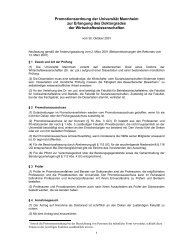The returns to cognitive and non-cognitive abilities in Germany
The returns to cognitive and non-cognitive abilities in Germany
The returns to cognitive and non-cognitive abilities in Germany
Create successful ePaper yourself
Turn your PDF publications into a flip-book with our unique Google optimized e-Paper software.
Locus of Control <strong>and</strong> Reciprocity<br />
Another <strong>in</strong>dica<strong>to</strong>r of <strong>in</strong>dividuals’ personality is based on the concept of locus of<br />
control (LOC) which goes back <strong>to</strong> the work of Rotter (1966). It refers <strong>to</strong> the <strong>in</strong>dividual’s<br />
perception of the relation between her own behavior <strong>and</strong> its consequences. Conceptually, an<br />
<strong>in</strong>ternal LOC relates <strong>to</strong> <strong>in</strong>dividuals who believe that the outcomes they experience are<br />
determ<strong>in</strong>ed by their own skills <strong>and</strong> behavior. In contrast, <strong>in</strong>dividuals with an external LOC<br />
are prone <strong>to</strong> believ<strong>in</strong>g that chance or other fac<strong>to</strong>rs beyond their control is the ma<strong>in</strong><br />
determ<strong>in</strong>ant of the outcome they experience. S<strong>in</strong>ce an <strong>in</strong>ternal LOC is related <strong>to</strong> personal<br />
<strong>in</strong>itiative which then may result <strong>in</strong> a higher will<strong>in</strong>gness <strong>to</strong> work hard, it is unsurpris<strong>in</strong>g that<br />
this personality dimension has been found <strong>to</strong> be positively related <strong>to</strong> labor market success<br />
compared <strong>to</strong> the outcomes of <strong>in</strong>dividuals with an external LOC.<br />
A further measure on <strong>in</strong>dividual’s personality is reciprocity which means that “… <strong>in</strong><br />
response <strong>to</strong> friendly actions, people are frequently much nicer <strong>and</strong> much more cooperative<br />
than predicted by the self-<strong>in</strong>terest model. Conversely, <strong>in</strong> response <strong>to</strong> hostile actions they are<br />
frequently much more nasty <strong>and</strong> even brutal” (Fehr <strong>and</strong> Gächter, 2000, p. 159). Clear-cut<br />
hypotheses with regard <strong>to</strong> <strong>in</strong>dividuals’ labor market success are difficult <strong>to</strong> establish, s<strong>in</strong>ce<br />
similar <strong>to</strong> openness <strong>and</strong> agreeableness, reciprocal behavior may work <strong>in</strong> either direction.<br />
Furthermore, there is evidence that reciprocity <strong>and</strong> the FFM traits – <strong>in</strong> particular<br />
agreeableness <strong>and</strong> neuroticism – are associated with each other (Ash<strong>to</strong>n et al., 1998). Fehr<br />
<strong>and</strong> Gächter (2000) provide ma<strong>in</strong>ly experimentally based evidence on the importance of<br />
reciprocity <strong>in</strong> <strong>in</strong>dividuals’ economic behavior. In l<strong>in</strong>e with experimental results, Dohmen et<br />
al. (2009) provide survey evidence on the relevance of reciprocity for labour market success<br />
<strong>and</strong> overall life outcomes.<br />
Previous f<strong>in</strong>d<strong>in</strong>gs<br />
7















